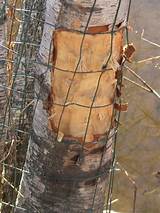How To Protect Trees From Beavers
Ronan Farrow
Apr 01, 2025 · 3 min read

Table of Contents
How to Protect Trees From Beavers: A Comprehensive Guide
Beavers are amazing creatures, vital to healthy ecosystems. However, their industrious nature can sometimes lead to conflicts with humans, particularly when their tree-felling activities threaten valuable landscaping or infrastructure. This guide explores effective and humane methods to protect your trees from beaver damage.
Understanding Beaver Behavior
Before implementing any protection strategies, it's crucial to understand why beavers fell trees. They don't do it out of malice; it's an essential part of their survival. Beavers use trees to:
- Build dams: Creating ponds provides safety from predators and a habitat for raising their young.
- Construct lodges: These underwater homes offer shelter and protection.
- Gather food: The bark and inner wood of certain trees form a significant part of their diet.
Understanding their motivations allows you to tailor your protection methods more effectively. For example, simply deterring them from a single tree might not work if they need it for dam construction.
Effective Tree Protection Methods
Several proven strategies can help shield your trees from beaver damage. Choose the methods that best suit your situation and the severity of the beaver activity.
Physical Barriers
- Tree Guards: These are cylindrical metal mesh cages that encircle the tree trunk, protecting the bark from gnawing. Ensure the guard extends from the ground to a height beavers cannot reach. Consider the size of the guard carefully, as too small a diameter could restrict the tree’s growth.
- Hardware Cloth: Wrap hardware cloth around the base of the tree trunk, securing it tightly. This creates a physical barrier against beaver teeth. Make sure to overlap the edges and secure it thoroughly to prevent beavers from accessing the bark underneath.
- Chicken Wire: Similar to hardware cloth, but less durable. It's a cheaper alternative but might need replacing more frequently.
- Repellent Fencing: Construct a fence around the trees you wish to protect. This should be tall enough to prevent beavers from climbing over it and deep enough to stop them from digging under. Use materials beavers find difficult to gnaw through, such as galvanized wire mesh.
Chemical Deterrents
While physical barriers are often the most reliable, repellents can also be effective, especially as a supplementary measure.
- Commercial Repellents: Many commercially available beaver repellents are on the market. These usually contain scents that beavers dislike, forcing them to seek food elsewhere. Always follow the manufacturer's instructions carefully, and remember that these repellents often need reapplication.
- Natural Repellents: Some natural deterrents, such as strong-smelling herbs or human hair, have shown some success. The effectiveness of these methods can vary greatly.
Other Strategies
Beyond physical barriers and repellents, other strategies can help manage beaver activity:
- Diversionary Planting: Planting trees or shrubs that beavers prefer in an area away from your valuable trees can draw them away.
- Water Management: If the beavers are building dams, carefully managing water levels in the area can discourage dam construction. This may involve installing a flow device or working with local wildlife officials. This requires careful planning and consideration of the surrounding ecosystem.
- Professional Help: Contacting a wildlife control expert is often the best option for severe or persistent problems. They have the expertise to handle situations safely and humanely.
Choosing the Right Approach
The best approach depends on various factors, including the number of trees to protect, the severity of the beaver activity, and your budget. Consider combining several methods for maximum effectiveness. Regularly inspect your chosen protection method and make repairs or adjustments as needed.
Remember, beavers are essential to the ecosystem. While protecting your trees is important, strive for humane and environmentally responsible solutions that minimize harm to these valuable creatures.
Featured Posts
Also read the following articles
| Article Title | Date |
|---|---|
| How To Make Coyote Bait | Apr 01, 2025 |
| How To Know If U Need Braces Quiz | Apr 01, 2025 |
| How To Hunt Afternoon Turkeys | Apr 01, 2025 |
| How To Keep Rats Out Of Grill | Apr 01, 2025 |
| How To Harvest Marijuana Autoflower | Apr 01, 2025 |
Latest Posts
Thank you for visiting our website which covers about How To Protect Trees From Beavers . We hope the information provided has been useful to you. Feel free to contact us if you have any questions or need further assistance. See you next time and don't miss to bookmark.
